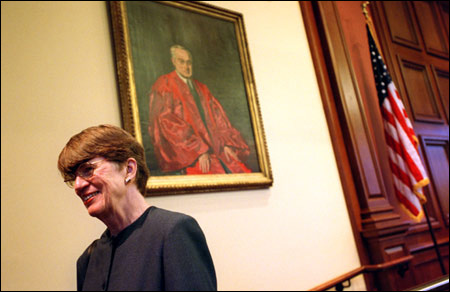A call for openness:
Former Attorney General Janet Reno calls for equity, justice, tolerance in face of terrorism

Particularly in a time of war and terror, Reno said that democracy must not be taken for granted. To illustrate her point, the Law School graduate talked about her own experience during the 2002 elections. Although she was a candidate for governor in Florida, Reno said she was unable to vote when she reached her polling place on Sept. 10, 2002. The brand-new computerized system, on which the state had spent millions in the wake of the 2000 presidential election fiasco, was not booted up. Moreover, none of the officials at the polls knew how to get the system online.
“You have no idea what it’s like to be told that you cannot vote on election day when you are otherwise eligible,” she told the audience at Austin Hall. “It makes you realize how precious that vote is, and how extraordinarily important it is to make sure that the electoral process works for the American people.”
Reno said she understood the financial burdens of paying for a legal education. Yet she said it is vital that good lawyers address the disaffection that the public has for the political process by going into public service. Otherwise, she said, distrust in the system would grow and the rule of law that underpins our civic institutions would decay and collapse.
“Unless [a nation’s] people are accepting of the law, unless its people have confidence in the law, we will be without the rule of law or any semblance of it,” she said.
Eschewing talk of civic malaise, she said that citizens wanted to get involved in the politics of their communities, but often didn’t know how. It is the responsibility of lawyers, Reno said, to facilitate the public’s participation in the law.
“We can train, we can educate, we can organize,” she asserted. “We cannot stand by and watch a significant part of the American population be without a voice in the legal procedures of this land.”
Reno said that lawyers should work to enhance the ability of the judicial system to seek the truth. She expressed shock and outrage at the 123 cases of inmates who had been sentenced to death, life imprisonment, or lengthy prison terms, and were then exonerated by DNA evidence within the past 10 years.
“That is an appalling number,” she said. “When you have that record with that limited pool of cases, think of how many people in this country have been convicted of a crime they did not commit and have served time, never to be shown justice.”
Reno criticized Attorney General John Ashcroft’s combative testimony before Congress in the wake of the war on terror. She received a round of applause when she asserted that, even with the new emphasis on national security, the strength of the American system was its ability to tolerate, rather than frustrate, dialogue.
“We have got to let people know that, when the attorney general of the United States comes to the Senate Judiciary Committee and implies that anybody who opposes him and the administration is somehow a lesser patriot, that that is plain wrong and that America’s real strength lies in speaking out, discussing, debating, and doing it in a respectful and thoughtful way.”
Speaking quietly, the former attorney general also said that a nation that could spend $76 billion to free people in the Middle East, could also afford to invest fully in pre-natal care, health care, and early childhood education.
“We have not yet designed … a funding stream from the federal government or state and local delivery systems that can ensure, in those first and formative years, the opportunity for that child to be safe, to be loved, to be cared for, to be supervised, to be held,” she said.
Reno rejected the notion that the problems she was discussing were for social workers or public health officials, rather than for lawyers. She challenged students to treat care for children or the elderly as issues of public policy and said that they had a duty to make the law and legal institutions work for all citizens.
“(We) have a special responsibility as lawyers … to make these children independent and self-sufficient and capable of participating and contributing and growing into strong and positive citizens.”
She closed by drawing an analogy between terrorism and Hurricane Andrew, the storm that devastated much of south Florida in 1992. Reno’s childhood home, which her mother built literally with her own hands, lay in the path of the storm. When Andrew hit, Reno said that her mother, though frail, sat calmly in the house, knowing that she’d built it “the right way.” The next morning, although most of the neighborhood lay in ruins, the home Reno’s mother built had lost only some shingles and a few screens.
“We can build America the right way,” she told students. “But the final effort has got to be with all of you.”




